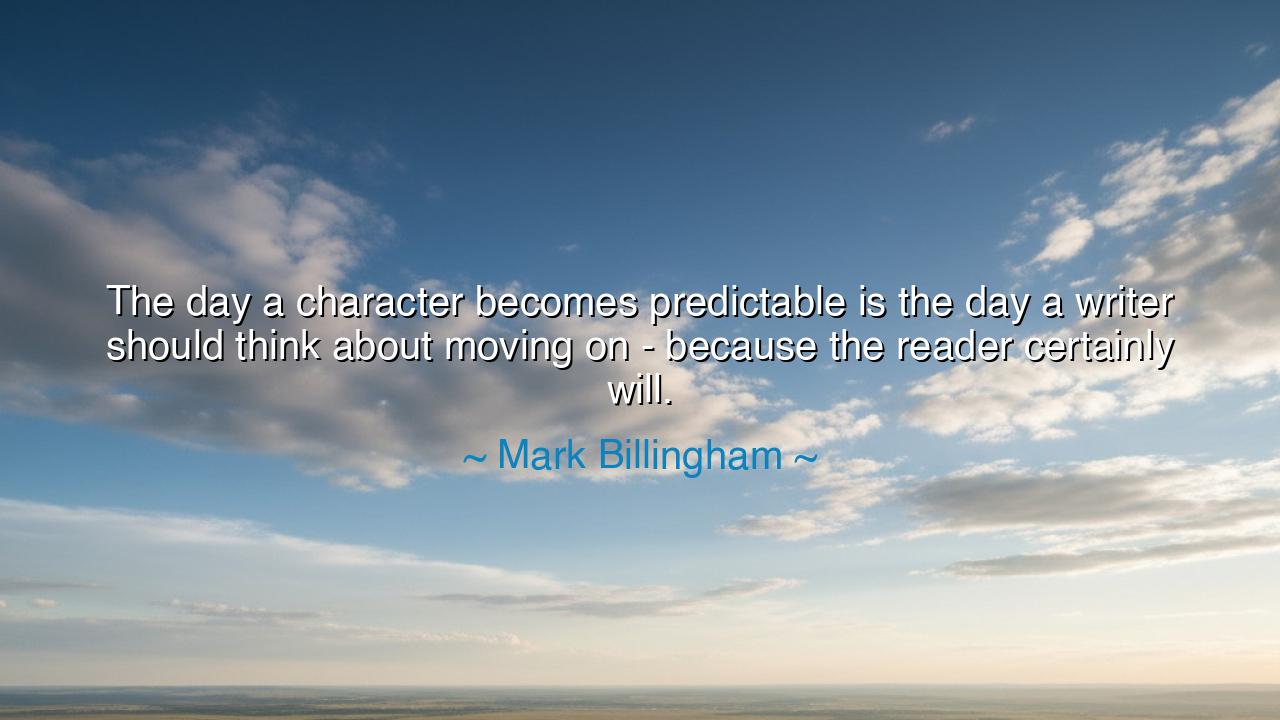
The day a character becomes predictable is the day a writer
The day a character becomes predictable is the day a writer should think about moving on - because the reader certainly will.






The words of Mark Billingham — “The day a character becomes predictable is the day a writer should think about moving on — because the reader certainly will.” — carry with them a truth as old as storytelling itself. They remind us that life, like art, thrives on mystery, on change, on the endless dance of surprise. A character who ceases to grow, who becomes too familiar, too safe, no longer holds the fire of interest. And just as the reader will set aside such a tale, so too does the soul grow weary of that which never transforms.
To be predictable is to become stagnant, to offer nothing new to the imagination. In the realm of narrative, it is death; in the realm of life, it is decline. For the ancients understood that all things that live must change. The river flows, the seasons turn, the child becomes the adult, and the adult becomes the elder. To resist change is to defy the very order of the cosmos. A character that fails to evolve betrays this law, and thus loses the reader’s heart.
History itself offers mirrors to this truth. Consider the reign of Louis XVI of France. His character, rigid and predictable, offered no growth, no adaptation to the storms rising around him. The people hungered for transformation, for vision, but found only repetition of the old ways. And so, just as the reader abandons a stagnant story, the people abandoned their king — and revolution came. His failure to evolve sealed not only his fate, but the fate of a dynasty.
By contrast, think of Winston Churchill, whose character was anything but predictable. From soldier to journalist, from political exile to war leader, he carried within him the gift of surprise and renewal. When the world expected silence, he roared with defiance. When all seemed lost, he summoned words that rekindled hope. Because he was never bound by predictability, the people did not abandon him. Instead, they followed him through the darkest nights of war. His life, like a great novel, turned pages no one could foresee.
Billingham’s words also serve as a warning to all who create, whether with pen, brush, voice, or even with the daily shaping of their own lives. The moment you become too comfortable, too rehearsed, too predictable, you risk losing the audience of your destiny. To move on is not always failure, but wisdom — a recognition that every story has its season, and that clinging to what no longer grows can kill both creator and creation.
The lesson is clear: in art, in leadership, in life, renewal is the secret of endurance. The reader seeks wonder, the follower seeks inspiration, the world seeks freshness. If what you are offering no longer surprises even you, it is time to seek a new path, a new voice, a new challenge. For just as the reader turns away from the stale tale, so will life itself turn away from those who refuse to change.
Practical wisdom follows. Examine your own story. Have you become predictable in your work, your relationships, your own self? If so, do not despair — instead, embrace the call to move on, to transform, to step into the unknown. Read new texts, seek new experiences, push beyond the walls of habit. Surprise yourself first, and in doing so, you will surprise others. Let your life, like a living novel, be filled with turns and revelations that keep its audience — both yourself and others — enthralled.
Thus, Billingham’s words endure as both guide and challenge: predictability is death, renewal is life. The writer must move on when the tale has grown stale; the reader demands it. And so too must we, the living characters of our own stories, embrace change, lest we be abandoned by the great Reader who is time itself. Surprise, evolve, transform — and your story will live.






AAdministratorAdministrator
Welcome, honored guests. Please leave a comment, we will respond soon